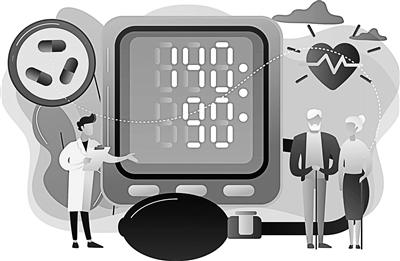The high and low blood pressure can't be blamed on the drug
Aunt Zhang, who has a history of hypertension for 5 years, discovered during the course of taking anti-hypertensive drugs that the effects of the drugs that had been taken with good efficacy in the past gradually "worse", and her blood pressure began to become unstable.
So, why did the antihypertensive drugs that have been taken for a few years "fail"?
In fact, the "bad" effect cannot be blamed on the drugs, because according to clinical observations, the following aspects will make it difficult for patients to control their blood pressure effectively.
Disease changes. Some patients are very effective when they first take certain antihypertensive drugs, so they do not monitor their condition regularly and do not have regular physical examinations.
Hypertension is not static, and some patients experience atherosclerosis worsening over time.
In addition, they may lack good living habits, or are overworked, or high blood pressure may affect the target organs. This is not the problem of the antihypertensive drug itself, but the change of the disease affects the efficacy of the drug.
For example, some hypertensive patients have developed from simple hypertension in the past to diabetes, etc., so combined medication should be considered to protect target organs and reduce complications.
Another example is that the degree of atherosclerosis is aggravated, and the original treatment plan cannot well control the changed condition. It is necessary for medical staff to work with the patient to find a new and suitable treatment plan to control blood pressure.
The medication is unreasonable. Some patients fail to adhere to the medication, stop taking the medication, or change the medication frequently.
If you fail to follow the doctor's advice and take the medicine correctly, it will inevitably affect the efficacy of antihypertensive drugs.
Frequent replacement of antihypertensive drugs will also affect the efficacy, because the longer some antihypertensive drugs are taken, the better the antihypertensive effect.
The antihypertensive effect of angiotensin II receptor antagonists such as valsartan works by blocking the receptor binding site. The effect is stronger than 6 months after taking the medicine for 1 year, and stronger for 6 months than 3 months. .
Therefore, when the medication is effective, there is no need to change the variety frequently.
Many patients with climatic factors have this experience: the same fixed set of treatment plans, blood pressure tends to be normal or even low when the weather is hot, and when the weather is cold, the peripheral blood vessels contract and blood pressure rises.
At this time, if you continue to use the same program, the effect may not be ideal, and you need to increase the dosage, frequency or variety of drugs.
In the face of the "deterioration" of antihypertensive drugs, some patients will go to the doctor because of the protracted condition, and some will believe in secret prescriptions and remedies. In fact, such practices are harmful and useless.
When blood pressure control is not ideal, the patient must not be impatient, trust the doctor, and report the situation to the doctor so that the doctor can deal with the specific situation accordingly and improve the treatment effect.
Patients should not change medicines privately, or stop taking medicines recommended by doctors suddenly, or increase the dosage of medicines without authorization, because such an approach will not only affect the efficacy, but may also increase adverse drug reactions.
When the visiting doctor still can't solve the problem, you can choose the cardiology department or hypertension specialist of the higher-level hospital for treatment, and bring the case and medicine packaging, so that the doctor can understand the past medical history and the medicines that are being used, so that new consultations can be made Of doctors understand past treatments.
Of course, in the case of "stubbornness" of blood pressure, patients themselves should also "self-check" to find out whether there are genetic factors, lifestyle, and occupational problems.
Text/Wu Shimin

